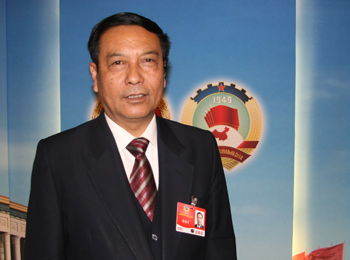By staff reporter Wang Ke
Under the hammer of the global financial crisis, agriculture, rural areas and farmers, the fragile foundation of China's economy and society, need more support from both central and local governments, a CPPCC member told China.org.cn today.
 Mr. Chen Xiwen, deputy director of the Leadership Group of the Office of Central Financial Work, and director of the Leading Group of the Office of Central Rural Work, stressed the need to maintain stable agricultural development, ensure sustainable incomes for farmers, and provide jobs in rural areas for returning migrant workers.
Mr. Chen Xiwen, deputy director of the Leadership Group of the Office of Central Financial Work, and director of the Leading Group of the Office of Central Rural Work, stressed the need to maintain stable agricultural development, ensure sustainable incomes for farmers, and provide jobs in rural areas for returning migrant workers.
Chen said: "The financial crisis has reduced overseas demand, and hit factories in the coastal developed regions; enterprises that engaged in foreign trade have cut jobs, affecting a considerable portion of migrant workers."
According to People's Daily, State Statistics Bureau figures suggest that by January 2009, out of an estimated 130 million migrant workers who had left rural areas to seek work, 15.3 percent, or about 20 million people, had returned home after having either lost their jobs or failing to find work as a result of the economic recession.
Premier Wen Jiabao promised in his March 5 report to the National People's Congress that China would increase funding for agriculture and rural areas. Central government allocations for agriculture, rural areas and farmers will total 716.1 billion yuan (about $105.6 billion) this year, a year-on-year increase of 120.6 billion yuan ($17.8 billion).
Chen told China.org.cn: "The government will significantly increase funding for public facilities in rural areas in the central and western regions, and relieve governments at county level and below of the burden of funding them."
He said greater priority will be given to major grain-producing areas in implementing the policies.
"The government will invest in projects for industrializing grain production," he said. "Investment can create jobs in rural areas. It means returning migrant workers won't need to leave home to earn money."
The 2009 draft central and local budgets allocate 344.59 billion ($50.835 billion) for expenditure on farming, forest and water conservancy projects, an increase of 74.493 billion yuan ($10.987 billion) or 27.5 percent. 6.5 billion yuan ($959 million) will be allocated for agricultural restructuring, an increase of 20.4 percent over last year.